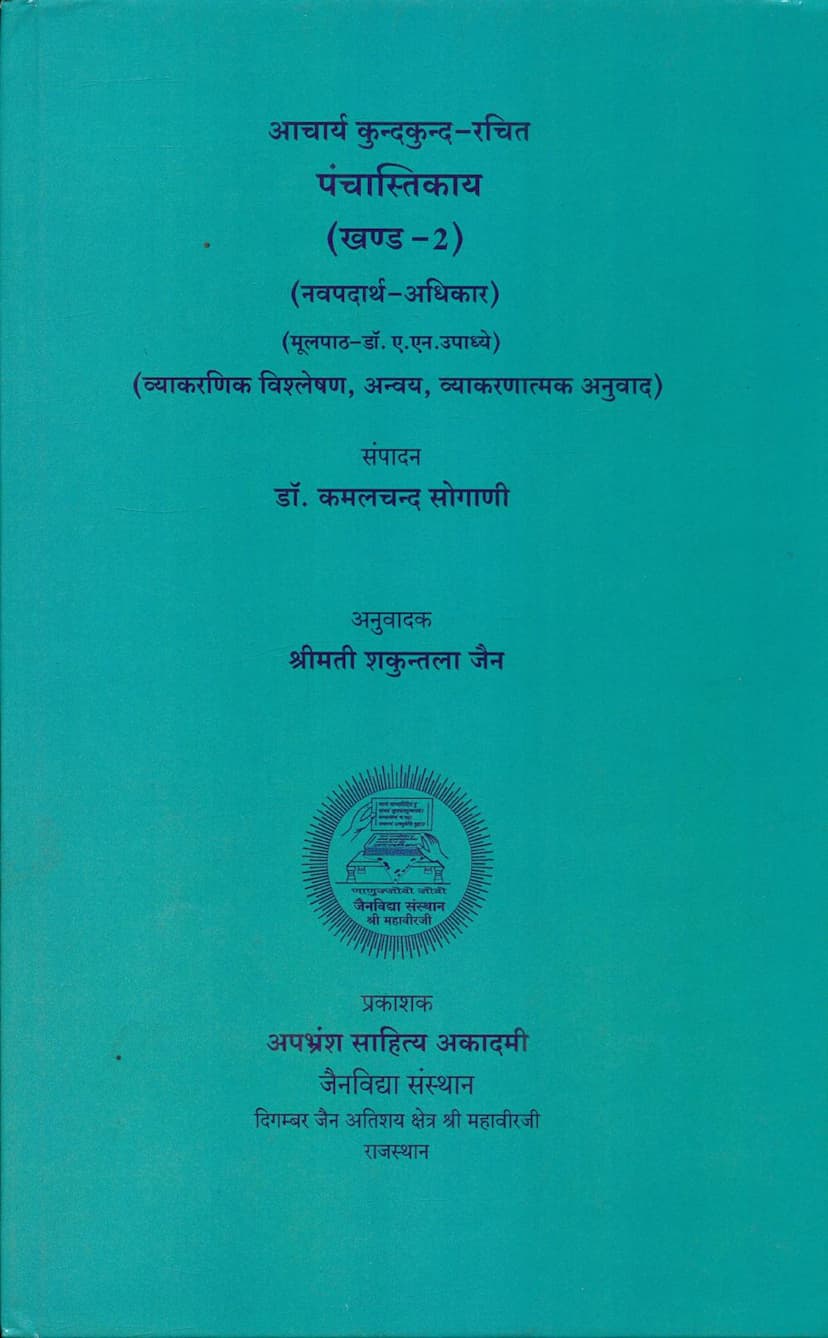Panchastikay Part 02
Added to library: September 2, 2025

Summary
This document is the second volume of "Panchastikaya" (also known as "Panchastikaya Part 02"), authored by Acharya Kundakunda. This specific volume focuses on the "Navapadartha-Adhikara" (Chapter on the Nine Substances).
Here's a breakdown of its content and significance:
Core Content:
- Author: Acharya Kundakunda, a prominent Jain philosopher believed to have lived in the 1st century CE.
- Title: Panchastikaya (खण्ड-2) नवपदार्थ-अधिकार (Panchastikaya, Volume 2: Chapter on the Nine Substances).
- Publisher: Apbhramsa Sahitya Academy, Jainvidya Sansthan, Shri Mahavirji, Rajasthan.
- Editing: Dr. Kamalchand Sogani.
- Translation & Interpretation: Smt. Shakuntala Jain.
- Original Text: Based on the critical edition by Dr. A.N. Upadhye.
- Language: The original text is in Sauraseni Prakrit, and this volume provides a Hindi translation and grammatical analysis.
- Focus: This volume specifically covers the verses (gathas) numbered 105 to 153 of the Panchastikaya. These verses elaborate on the "nine substances" (Navapadartha) in Jain philosophy.
The Nine Substances Explained:
The book details the following nine categories:
- Jiva (Soul): Described as conscious, possessing the characteristic of consciousness. It is further divided into worldly (samsari) and liberated (mukta) souls. The text categorizes worldly souls based on the number of senses they possess (one to five senses).
- Ajiva (Non-soul): Anything that lacks consciousness. It is classified into five types: Pudgala (matter), Dharma (medium of motion), Adharma (medium of rest), Akasha (space), and Kala (time).
- Punhya (Merit): The transformation of pudgala (matter) into karmic form due to auspicious mental states and actions of the soul (like compassion, devotion, absence of anger, pride, delusion, greed).
- Papa (Demerit/Sin): The transformation of pudgala into karmic form due to inauspicious mental states and actions (like carelessness, malice, greed, harming others, neglect of knowledge).
- Asrava (Influx of Karma): The inflow of karmic particles into the soul through the activities of mind, speech, and body.
- Bandha (Bondage): The connection of these karmic particles with the soul.
- Samvara (Stoppage of Karma): The cessation of the inflow of new karmas by controlling the activities of mind, speech, and body.
- Nirjara (Shedding of Karma): The gradual or complete shedding of accumulated karmas through austerities and conscious effort.
- Moksha (Liberation): The complete annihilation of all karmas, leading to the soul's attainment of its pure, omniscient, and blissful state.
Key Features of the Book:
- Detailed Grammatical Analysis: For each verse (gatha), the book provides:
- Mula Path (Original Text): The Prakrit verse.
- Anvay (Word Order): The rearranged order of words for better comprehension.
- Vyakarana-vikarana Anuvad (Grammatical Translation): A word-by-word translation with grammatical explanations.
- Kosh (Lexicon): Extensive appendices including a lexicon of nouns, verbs, participles, adjectives, pronouns, and indeclinables, along with their grammatical information and page references.
- Clarity and Accessibility: The translation is praised for being simple, easy to understand, and presented in a modern style, making the complex Jain philosophy accessible to a wider audience.
- Comprehensiveness: The book aims to provide a thorough understanding of the Sauraseni Prakrit language and Jain philosophy through the detailed analysis of the verses.
- Supporting Materials: Includes indices, a glossary of grammatical terms, and a list of relevant reference books.
Significance:
This volume is a valuable resource for students and scholars of Jainism and Prakrit literature. It offers a clear and structured approach to understanding Acharya Kundakunda's profound teachings on the fundamental principles of existence as per Jain doctrine. The meticulous grammatical analysis and extensive lexicons are particularly helpful for those wishing to delve deeper into the original Prakrit text.